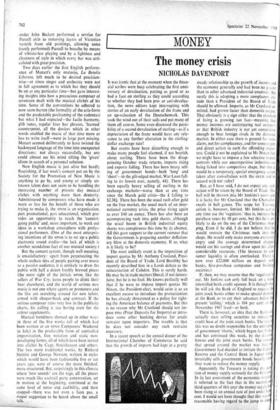We never close
MUSIC MICHAEL NYMAN
Music is alive and flourishing in considerable opulence in London; there's an unprecedented 'we never close' atmosphere about at the moment, performances six times nightly (at least) on the South Bank, at the Wigmore Hall, the two opera houses and a variety of real or assumed concert halls from the Hampstead Everyman to Fairfield Halls, Croydon. But if you see the gluttonous weekly concert lists as a Dow Jones index to- the health of the musical scene, look again. You might find the seem- ingly haphazard and uncoordinated planning exciting and 'democratic,' the possibility of see- ing Chinese opera.avelcome, if you could bear to miss Alfred Brendel, or George Szell; and if you fancied two 'Brahms only' concerts within four days, you would have been in luck at the Festival Hall quite recently. (Perhaps 'space,' or rather time, was booked for Couperin at birth and Rossini at death to be certain that their anniversaries were given adequate coverage.) If it is a clichd to point out once again that, for the classics, it is 'business as usual,' it is still necessary, for in the past few weeks our well-fed musical culture has shown that it can survive very happily in ignorance of the fact that a little music has been written since 1918. For the only 'novelties' one has had to turn, unbelievably, to concerts of Purcell and Mozart at the Queen Elizabeth Hall, both of which re- . lated in different ways to cliches of another kind. Earlier this month, Musica Reservata
* under John Beckett performed a service for Purcell akin to removing layers of Victorian varnish from old paintings, allowing some (rarely performed) Purcell to breathe by means of vibrato-less playing and by a lightness and cleanness of style in which every bar was arti- culated with great precision.
Two days earlier the first English perform- ance of Mozart's only oratorio, La Betulia Liberata, left much to be desired precision- wise—at times singer and orchestra were not in full agreement as to which bar they should be on at any particular time—but gave interest- ing insights into how a precocious composer of seventeen dealt with the musical clichés of his time. Some of the conventions he adhered to now seem barren (the formality of the aria-form and the predictable positioning of the cadenzas) but what I had expected—the facile harmony, glib tunes, regular four bar phrases, 'learned' counterpoint, all the devices which in other words enabled the music of that time more or less to write itself—were in large part missing. Mozart seemed deliberately to have twisted the hackneyed language of the time into unexpected directions : not always successfully, but one could almost see his mind sifting the 'given' idiom in search of a personal solution.
New English music is just alive but hardly flourishing, if last week's concert put on by the Society for the Promotion of New Music is anything to go by, and young or simply un- known talent does not seem to be handling the increasing number of present day musical clichés with anything more than dexterity. Administered by composers who have made it more or less for the benefit of those who are trying to make it, the SPNM is an organisation, part promotional, part educational, which pro- vides an opportunity to reach the 'concert- going public' and, more important, to work out ideas in a workshop atmosphere with profes- sional performers. (One of the most enterpris- ing intentions of the SPNM is to set up a public electronic sound studio—the lack of which is
another scandalous fact of our musical society.) But the concert system, though well meaning, is unsatisfactory: apart from perpetuating the whole archaic idea of people putting over music to a passive audience, it is unlikely to draw the
public with half a dozen freshly brewed pieces (the mere sight of the initials SPNM, like the
sellers of War Cry, turns people to drink their beer elsewhere), and the world of serious new music is not one where agents or promoters and the like are searching around for new talent, armed with cheque-book and contract. If the serious composer rates very low in the publicity charts, his calling is too boring even for the colour supplements.
Musical trendiness showed up in other ways in three of the five works (all of which had
been written at an SPNM Composers' Weekend
in July) in the predictable form of controlled improvisation, free notation and static non- developing forms, all of which have been turned into clichés by Cage, Stockhausen and others. The two more traditional works, by Richard Steinitz and George Newson, written in styles which would have been fashionable five or ten years ago, were of course the more finished, more structured. But, surprisingly in this climate where 'new sounds' are the rage, all the pieces were much like cocktail party conversation, set in motion at the beginning, continued at the same level of sense and audibility, and then stopped—there was not even a faux pas, a risque suggestion to be heard above the small talk.



































 Previous page
Previous page